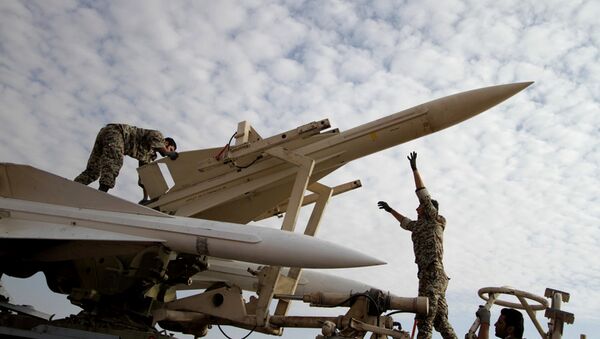On 8 January, US President Donald Trump announced new sanctions against Iran in response to the Islamic Republic's ballistic missile strike on Iraqi bases hosting American troops, thus dispelling fears of a new military conflict in the Middle East, largely provoked by his earlier bellicose statements.
The American president emphasised that no Americans were harmed in the Iranian attack and only minimal damage was sustained at the US military bases. The attack came in response to Washington's extraterritorial targeted killing of Iranian top-ranking military official and Quds Force commander Qasem Soleimani.
Iran Showed Restraint, Could Have Struck Much Harder
"I think Iran showed tremendous restraint while effectively sending a message they are not only fully capable of defending themselves but they have the backing of Russia and China", says Max Parry, an independent American journalist and geopolitical analyst. "They could have struck back much, much harder but settled for attacking US bases which the assassination of Soleimani made vulnerable".
According to the journalist, Trump made "a huge blunder" by threatening to attack targets within Iran, which gave the Islamic Republic "legal right to self-defence".
"It was a dare to see how willing Washington is to pursue war and an expression of the collective strength of the Axis of Resistance", he opines, referring to a Russia-Iran-China "triumvirate".
Mark Sleboda, a US military veteran and security and international affairs analyst, also believes that Tehran's 7 January strike constituted a "minimum response" and was largely a "symbolic" attack.
"This is very much like the US cruise missile strikes against Damascus a couple years ago over those Douma chemical weapons hoaxes. Those were choreographed forewarn attacks, no Syrian troops were killed", the security analyst recalls, adding that he does not rule out that there could have been some warning signals through backchannels to the US before the Iranian attack.
Trump's De-Escalation Was Apparently Step in the Right Direction
The fear of a potential escalation in tensions floated in the air after Iran's strike, as previously Trump had tweeted that if Iran were to hit any Americans or US assets, Washington would strike 52 sites important to Iran and Iranian culture "very fast and very hard".
....targeted 52 Iranian sites (representing the 52 American hostages taken by Iran many years ago), some at a very high level & important to Iran & the Iranian culture, and those targets, and Iran itself, WILL BE HIT VERY FAST AND VERY HARD. The USA wants no more threats!
— Donald J. Trump (@realDonaldTrump) January 4, 2020
However, even prior to Trump's address that dotted the i's and crossed the t's with regard to Washington's response to the Iranian ballistic missile attack, Philip Giraldi, a former CIA field officer counter-terrorism specialist, ruled out the possibility of an all-out confrontation: "I expect that it will be short of an actual war, probably an attack on an Iranian base or facility", he said.
For his part, Dr Paul Craig Roberts, an American economist and former assistant secretary of the treasury for economic policy under President Ronald Reagan, hails Trump's decision to de-escalate.
"The Iranian attack resulted in no US casualties", he says. "Thus, it serves both Iran’s purpose of retaliating and Trump’s purpose of interpreting the Iranian retaliation to be, in effect, a stand down".
According to the former US official, Trump may use "crippling sanctions" as a "cover for withdrawal from most of the Middle East", which was the president's initial idea.
In his blog, the economist expanded on this idea, suggesting that "the war scare has introduced a sobering element" and that Trump "is in a better position now to stand up to" the interests of the US military-industrial complex, hostile forces within the international community, and impeachment-seeking Democrats.
However, Dr Rubrick Biegon, a lecturer in international relations at the School of Politics and International Relations of the University of Kent, holds a different stance, presuming that Trump's decision to de-escalate military tensions with Iran is "unlikely to move public opinion", that "doesn’t have a great deal of confidence in Trump’s capacity to handle an international crisis, particularly when the crisis is widely seen to be one of [his] making".
According to him, Democrats will continue to link the Iran crisis "to Trump’s erratic leadership".
The House is moving forward with @RepSlotkin's War Powers Resolution limiting the President’s military actions regarding Iran. The Admin must work with the Congress to advance an immediate, effective de-escalatory strategy which prevents further violence. https://t.co/i3KU9bqWqh pic.twitter.com/9bwnjBMjnz
— Nancy Pelosi (@SpeakerPelosi) January 8, 2020
Wait and See Whether Iran Carries Out Further Attacks
While neither the US nor Iran seems to want to raise the stakes in the region, at least currently, there is still the possibility that the tensions could soar, deems Wall Street analyst and investigative journalist Charles Ortel.
"Events of 7 January may represent only an initial step in Iran’s response", says the analyst referring to the Islamic Republic's ballistic missile strike. "If Iran carries out any further attacks, directly or through Iran-funded proxies that cause physical harm to our troops or to our citizens, then I suspect the United States, possibly with allies including the United Kingdom, may exact punishments across the full suite of options including financial, cyber, and military means".
On Thursday, Head of the Revolutionary Guards Aerospace Force Brigadier General Amir Ali Hajizadeh stated that the strikes on US forces in Iraq were just the beginning of Iran's full-scale operations across the region, while another top IRGC general, Abdollah Araghia, stressed that Tehran would take “harsher revenge soon”, as quoted by the country's Tasnim News Agency. Earlier, Iranian Supreme Leader Khamenei tweeted that although the US was "slapped" by Iran's retaliatory missile strikes, "such military actions are not enough".
According to Ortel, one has to adopt a wait-and-see approach while assessing how the situation will unfold.




